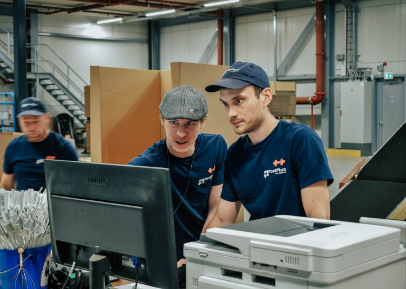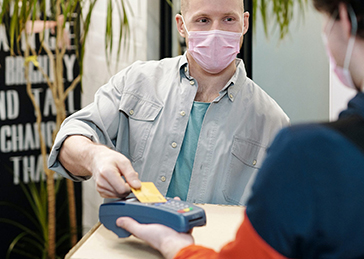Categories for 我们的核心人员
PostPlus:购物无国界
欧洲是全球主要的电子商务市场之一。
最近的一项估计表明,在 2021 年期间,整个非洲大陆的消费者将在线下的订单价值约 3,920 亿欧元(4,650 亿美元)(https://internetretailing.net/rxgeu/rxgeu/european-ecommerce-revenues-jump-30-to-us465bn-in-2021)
当然,我们对电子商务的依赖只是在 Covid 期间增加了,特别是因为许多国家的封锁措施意味着大街上的商店都关闭了。
最大的销售额可能来自英国、德国和法国的购物者。
然而,国内和国际品牌也看到居住在其他地区的人们的在线订单迅速增加。
这就是为什么在两年前推出 PostPlus 时,我们决定专注于为零售商提供一种更好、更可靠且在许多情况下更快的方式与波罗的海国家、斯堪的纳维亚和东欧的消费者互动的原因之一。
我和我的同事在提供所有这些领域的优质服务方面拥有丰富的经验。
对国家、本地甚至超本地物流的深入了解对于确保欧洲境内外的电子商务公司快速、有效地寄售货物至关重要。
毕竟,我们发货的国家/地区的消费者可能使用不同的货币并使用不同的语言,但他们与更大、更成熟的欧洲市场的消费者有着完全相同的需求。
正如我一直在告诉 Post & Parcel,世界领先的供应链出版报刊之一,我们的产品推出也引起了我们的客户和他们自己的客户的共鸣(https://postandparcel.info/141334/news/postplus-set-for-further-expansion/).
在 PostPlus 开始交易的两年内,我们现在代表越来越多的企业每月处理 200 多吨小包、包裹、印刷材料。
我们现在交付的国家/地区是我们开始时的三倍以上,因此,我们的营业额大幅增加。
然而,衡量我们成功的真正标准是我们发货的速度和准确性。
尽管现在世界上的城镇和城市的实体店再次向消费者开放,但我们相信,人们对网上购物的兴趣是不变的。
为了不仅保持并且提高我们的服务标准,我们计划进行重大战略投资,使我们的客户能够增加销售额。
此外,我们了解到,虽然国家邮政运营商在重要的最后一公里交付方面拥有值得信赖的能力,但有时其他较小的本地快递公司在某些目的地可以提供更好的质量。
随着我们处理的数量增加,我们创新的交付合作伙伴的处理量也在增加。
随着欧洲“三大”市场以外的电子商务销售额不断增长,我相信在线品牌将继续更加重视本地经验、专业知识和卓越品质,而这正是 PostPlus 每次都致力于提供的。

我们的团队
正如我们承诺的那样,我们和我们最新的团队成员–全球商业发展主管Bjorn Moberg一起探讨,我们向他提出了几个问题关于什么对你们来说是有趣的。
请自我介绍一下,你为什么加入PostPlus?
“首先,感谢PostPlus全体的热烈欢迎。我的名字是Bjorn Moberg,我非常自豪和高兴成为快速发展的POSTPLUS的一员。今年3月份,我加入了PostPlus,我对PostPlus的“以客户为中心”的做法印象深刻,我的同事们态度热情,尽最大努力帮助现有和新的客户将他们的小包裹转移到国外,直接转移到关键电子商务市场上的在线消费者–就像PostPlus所做的–“我们传递快乐”。
在加入 PostPlus 之前,我曾在电子商务物流行业担任过多个管理职位。在该行业的 15 年中,我在欧洲、中国和美国管理并负责业务发展,其中包括小型电子商务包裹的主要出口市场。
PostPlus 的联合创始人和他们的商业理念以及他们在电子商务物流行业的经验使我很容易决定加入 PostPlus。此外,该公司通过三个 ETOE 提供 DDU、DDP 和最后一公里服务的交付服务以及替代承运人以确保承运人的最佳组合,从而为在线消费者提供直接交付等解决方案,从而为市场提供强大的价值。此外,该公司对技术的精通和靠近波罗的海地区优秀 IT 资源的能力使得集成无缝并将我们的解决方案与世界各地的托运人快速有效地连接起来。
成为 PostPlus 的一员非常令人兴奋,因为它是一家年轻的创业公司,具有成功的精神,包括为赢得客户业务而付出更多努力的心态。 PostPlus 通过从我们位于荷兰阿姆斯特丹(欧洲新的电子商务中心)的保税设施向世界各地的最终收件人提供友好的交付解决方案来增加价值。 PostPlus 是一家敏捷公司,拥有以行动和解决方案为导向的文化,一切皆有可能。

关于POSTPLUS
该公司成立于两年前。POST+BV是总部设在爱沙尼亚塔林的InfiniteMile OU和位于荷兰Hoofddorp的CchainGlobalBV于2019年第一季度成立的一家合资企业。这两家公司结合了力量、知识和经验,组成了一个强大的团队,在全球范围内开展活动和开展业务。该公司的主要中心设在荷兰阿姆斯特丹。商业办事处设在爱沙尼亚塔林。
公司最强大的一面是建立它的人。在邮政服务、国际业务发展、物流和信息技术领域非常有经验的董事会。他们中的大多数已经为邮政服务工作了十多年。
从一开始,PostPlus就开始了与立陶宛邮政的合作。2020年8月,它扩大了范围,并与乌兹别克斯坦邮政建立了伙伴关系。一年后,PostPlus在中国和美国都有了代理商,按业务量增长了3倍。
PostPlus是一家为电子商务专业人士和任何需要可靠邮政和快递服务的人提供的物流服务提供商。对于我们来说,每个客户都是独一无二的,我们准备为他们设计专门的服务。我们从原产地到转运中心,将货物转换为邮政,向邮政运营者提供线路运输,并提供最后一公里的邮寄服务。
POST+希望为客户提供满意和需求的价格水平,同时保证质量。我们以透明的方式交付包裹,并为最佳的领先时间而竞争。你总是可以依靠我们来提供服务。

2020年邮政行业趋势
本年度主要关键词是 Covid-19,如所有行业一样,它也影响了邮政行业。从 Postplus 的角度来看,我们经历了近 100% 的派送增长。
由于我们是一家进入市场仅一年的年轻公司,我们目前主要投资于服务流程、扩大团队和设立新部门。但是,推动该行业今年增长的趋势是什么?
Escher 发布了他们的第三份未来邮政调查,该调查总结了对 52 个国家邮政局运营方法的见解,包括投资的关键领域、自动化战略、产品渠道选择和逆向物流计划。
邮政行业认为投资包裹和电子商务的关键服务至关重要,这是合乎逻辑的,这些领域继续优先于传统服务,例如邮件和金融服务。与去年的调查结果非常相似,52% 的邮政运营商使用数据分析,17% 计划在未来 12 个月内实施数据分析。使用这些数据的巨大潜力仍然存在。由于电子商务邮政流量在今年实现了几年后才预期的增长,邮政需要管理这一趋势。更加人性化的跨境电子商务服务功能,以加快和顺畅的交付过程增加。
POS 渠道继续依赖传统和实体服务点,同时在未来 12 个月和未来五年内使渠道组合多样化,以包括更多自动化解决方案,例如自助服务亭和移动应用程序。邮政仍然非常热衷于他们的传统——大多数参与的邮政运营商 (98%) 仍然使用邮局柜台作为其渠道组合的一部分。
在COVID大流行期间,所有地区超过 43% 的邮局包裹量大幅增加,尤其是在本土市场。 83% 的人采用了新的解决方案或新方法来适应新环境。因此,现有邮政企业需要通过进一步优化其当前运营,提高分拣、运输、取件和交付以及经常被忽视的业务支持职能方面的卓越运营来加强竞争。

您需要了解的关于在奥地利邮寄的所有信息
在这个博客部分,我们想介绍我们在欧洲交付最多的国家。我们要谈论的第一个国家是奥地利。
直到 1996 年 5 月 1 日,Österreichische Post AG,即今天的奥地利邮政服务,都是联邦政府的一部分;当时称为邮政和电报管理局 (Post- und Telegraphenverwaltung – PTV),由交通部负责。
Österreichische Post AG。与 TA 不同的是,Österreichische Post 仍然完全掌握在奥地利共和国手中。所有权由联邦财政部通过控股公司 Österreichische Industrieholding AG (ÖIAG) 行使。另一方面,邮政监管机构的职责由联邦运输、创新和技术部 (bmvit) 承担。
邮政服务可分为三类:
垄断服务:重达 50 克的信件(寄往国外目的地的邮件除外,自 2003 年 1 月 1 日起已完全开放)
普遍服务:重达 2 公斤的邮政物品(信件、报纸等)和重达 20 公斤的包裹
开放竞争的服务:所有其他邮政服务。
奥地利人在电子商务方面表现得比较保守。例如,66% 的人更喜欢用发票付款。奥地利人的退货率也是欧洲最高的。 年退货率在62%。

2021 年为邮政服务带来了什么
Mike:“我认为跨境 B2C 物流将在 2021 年继续快速(两位数)增长。由于 22 欧元的最低增值税已在7 月 1 日取消,2021 年欧盟电子商务贸易将出现很多混乱。”
Gunnar:“这意味着应该申报低价值包裹,除了指定的邮政运营商之外,更多非邮政公司将活跃在当地市场。 Postplus 还将与当地的非邮政公司建立网络。专注于新产品开发和销售额的持续增长。”
Mike 和 Gunnar 认为客户对更好的价格和质量的要求会越来越高。 “独特定制的解决方案将是他们将鼓励我们开发的方向“, Mike说。 “他们寻求一站式购物服务,期望有广泛的服务/产品来满足他们的需求”, Gunnar 补充道。董事会成员确保他们努力满足甚至超越客户的要求,尽管有时这是不可能的或几乎无法实现的。 “ 明年 IT 解决方案的重要性将进一步增长,”,Mike 也确认, “我们无可否认技术发展在我们业务中的核心作用,并不断投资于 IT 发展,现在,我们正在招聘公司的 CTO(首席 IT 官),他将负责实现 Post+ 的 IT 战略。“具有自动化流程的可靠且客户友好的解决方案以提高运营效率和客户服务将是我们关注的重点。” Gunnar 也是同样的看法。

PostPlus: LOCKDOWN SPURRING ONLINE GROWTH
The last 18 months have created tremendous changes in the way that we live and work.
For instance, as a result of many of the world’s leading economies effectively closing their high streets in order to limit the spread of Covid-19, consumers were obliged to do their shopping online.
The impact of that shift has now become apparent.
A comprehensive report published by Ecommerce Europe and EuroCommerce has calculated that online orders across the continent accounted for €757 billion ($884.4 billion) worth of business during 2020 – an increase of 10 per cent on the year before.
That sales grew while shoppers had little alternative for many months will in itself not surprise too many people.
Nor will many individuals be taken aback to find that the UK remains the continent’s biggest single online market.
Nevertheless, this new data still highlights many emerging patterns in online shopping which will potentially shape the sector in the years to come.
For instance, the biggest rate of growth occurred not in the leading e-commerce nations of Western Europe but towards the east, which saw sales rise by 46 per cent.
Furthermore, the research bears out the experience of myself and my colleagues at PostPlus.
It documents the gradual adoption of online shopping in some of those countries which account for some of the large volume of items which we now ship on behalf of leading e-commerce brands.
One-fifth of consumers from Estonia who contributed to the study told how they had bought goods online at least six times in the previous three months – on a par with some of the much bigger e-commerce territories and only slightly less than Denmark (26 per cent), Norway (28 per cent) and Sweden (25 per cent).
Even more startling was the number of shoppers content with buying items from retailers overseas.
Just under two-thirds (63 per cent) of consumers in Latvia reported having placed orders with sellers based either in or outside of the EU, enough to see it ranked eighth out of the 33 countries analysed for cross-border e-commerce purchases.
Such developments underline the reasons why PostPlus decided to concentrate on providing retailers with more effective and efficient services deliveries to and returns from consumers in the Baltic states, Scandinavia and Eastern Europe.
The growth in online shopping here and in similar territories preceded the pandemic and is broader even than that detected by Ecommerce Europe and EuroCommerce.
What we fully understand is that although some of these markets are less mature than the UK, France and Germany in terms of their history of buying online, their customers expect the very same standards in terms of speed, cost and convenience.
This latest report confirms in very clear fashion how the pandemic has cemented e-commerce in the shopping habits of the modern consumer.
However, I am confident that further data in the months and years to come will demonstrate that they remain happy to order online long after the last lockdown measures have been lifted.
Alexander Shchekotin

NEW NORMAL, SAME OLD RED TAPE
Over the last 18 months, the global logistics industry has experienced tremendous pressure and historic change.
The coronavirus pandemic, of course, closed a significant proportion of the world’s high streets, driving consumers online.
As a result, the e-commerce orders in Europe during 2020, for instance, soared to €757 billion ($884.4 billion) – an increase of 10 per cent on the year before.
However, the potential to grow overseas sales – and see them delivered in the timely and efficient manner now expected by consumers – was greatly challenged by another feature of the Covid-era logistics sector.
The International Air Transport Association (IATA) has published figures revealing that available cargo capacity fell by 75 per cent in the weeks after measures to prevent the spread of the virus came into force.
Even though many of those restrictions have eased and the amount of air traffic has increased, the Association has highlighted only in the last fortnight that cargo capacity is still down on normal.
It believes that the situation could create “supply chain bottlenecks” due to production ramping up as we head towards the annual peak season for the parcel industry.
With consumers now keen to receive their purchases quickly, especially if orders are Christmas gifts, will they resist the chance to buy cross-border if there’s even a potential for delay?
In the last few days, I’ve been speaking on the topic to delegates attending the Parcel and Post Expo in Vienna.
I’ve set out how I believe the Universal Postal Union (UPU) – the United Nations agency which co-ordinates postal policies – has a part to play in removing possible deterrents to the growth in international e-commerce.
The UPU is only too well aware of the impact of online retail on volumes handled by its 192 member countries.
One report published in May this year illustrated that whilst the amount of mail fell by 43 per cent in the decade up to 2019, parcel traffic had grown by more than 250 per cent over the same period.
In fact, parcels – most of them generated by e-commerce – account for almost twice the percentage of all the materials dealt with by national posts that it did in 2009.
That said, national posts and their commercial partners still find themselves having to operate within constraints which pre-date the age of online retail.
I quoted one example to the Vienna audience showing how red tape had hampered efforts by one of the world’s leading national posts to clear a large accumulation of mail and parcels which built up because its national airline effectively shut down cargo flights at the height of the pandemic.
After three months, that backlog had grown to 600 tonnes, so the post concerned called in a private operator to help.
With a mixture of ingenuity and hard work on both sides, they managed to reduce the mail and parcel mountain by half.
They couldn’t go any further because the depot owned by the private company involved wasn’t able to quality for IMPC (International Mail Processing Centre) status, something which could have helped clear all of the backlog.
It meant that, in that case and in others, national postal organisations haven’t been able to fully leverage the know-how of commercial partners and identify opportunities for growth.
I think it’s a shame that posts are prevented from fulfilling their Universal Service Obligations (USOs) and their true potential by the current set of regulations, especially in a world radically different from one which we lived in only 18 months ago.
Regulators – both customs authorities and those in charge of the global postal industry – arguably need to show the same sort of willingness as the world’s population in adapting how we all work to move with our rapidly changing times. The failure to do so may limit the ability of postal operators, private logistics specialists and retailers alike to capitalise on the appetite of consumers to buy goods from abroad.



